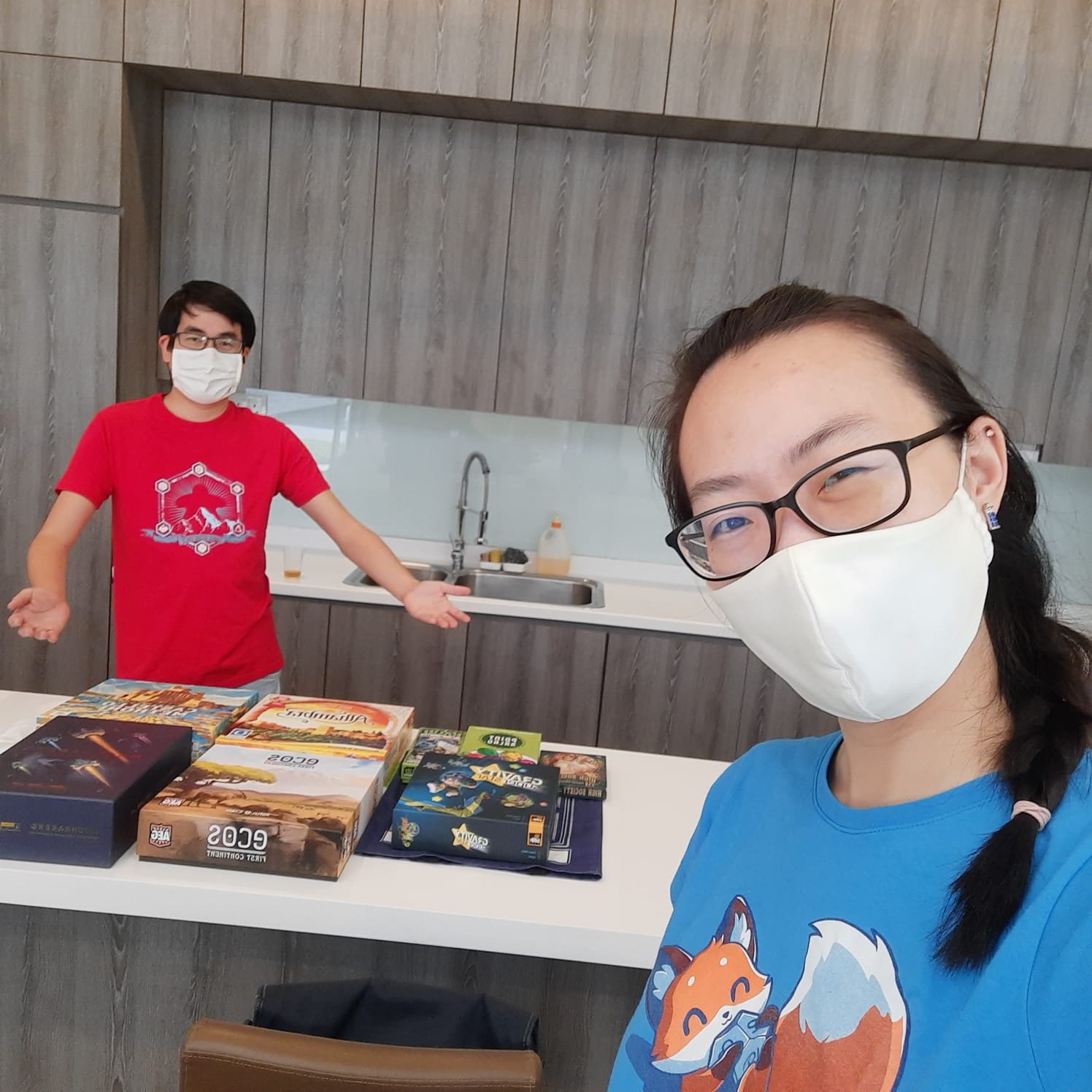Why and how game groups matter
When we were designing Fly-A-Way, we greatly benefitted from playtesters who would not only share their insights but offer to take our prototype to do further tests with their regular game groups.
Befriending the Singapore Game Makers and the Thursday Playtesters, we were struck by the wealth of knowledge they had developed, playing and talking about games on a regular basis. We also realised there were so many other game groups out there that we knew little about.
So, as part of our ongoing efforts to share insights from the gaming community, we spent the last month reaching out to game groups that served a range of social needs: an inclusive space for all genders, a welcoming place for casual gamers and an avenue for conversations on mental well-being.
The place where the people matter more than the games
When Joel Lim started regular board game sessions at the function room of the condominium he used to live in with his parents in 2017, he thought he would play a lot more games than before. He was wrong. He ended up hosting more than playing.
Numerous game sessions later, the 29-year-old has no regrets. In fact, he has fully assumed the role of being “other-centric”, which involves making rounds to different game tables and ensuring everyone, whatever their background, gender or exposure to games, is comfortable.
“The games, they are fun, they are an avenue…but [they] cannot be the focus. The focus has to be the people.”
This year he moved into a new home with his wife and has started hosting game sessions there. Following Covid-19 safe distancing measures, participants are capped to the handful that are allowed. Before the pandemic, about 15 to 20 people would attend his game sessions.
Joel sees his group as an inclusive space, where no one is left to fend for themself if they have any concern or issue while playing. This includes women, who have shared with him that they did not feel comfortable attending some board game groups they found online because the male participants hit on them.
Another demographic he hopes to serve is casual gamers who might visit board game cafes and find that the staff do not know how to play the available games. They end up wasting their money and “reading the rules for half an hour”, he says.
Joel has a collection of games that spans from light to heavy, catering to different audiences. He takes the curation of games so seriously that he would even set up that one party game that draws as many laughs from casual gamers as it does groans from tabletop game enthusiasts.
“I want to play a super heavy game, but [if] all of my friends want to play Exploding Kittens, which is not my favourite game…I will still play it.”
He laughs when he mentions the vanilla card game by the comic site The Oatmeal. But you get the feeling he is not joking about his commitment to hosting.
“My experience is secondary to everyone else’s experience,” he says.
👉 If you’d like to know more about Joel’s group or join a game session, reach out to him here.A Jackbox party to ward off the pandemic blues
On the messaging platform Discord, Griselda Gabriele had a chat group to connect with her US friends while she worked in Singapore. They toyed with the idea of playing Dungeons & Dragons, but finding it to be too much of an effort, gave up.
Then the Covid-19 pandemic happened and the group, made up of artists who bonded over chats about their favourite shows, decided to try the party game Among Us in late 2020. It was a hit. Earlier this year they moved on to Jackbox Games, the popular platform for writing, trivia and hidden identity games.
Along the way, Griselda noticed that someone would share that they had felt lonely or had missed everyone. The game group had become more than just a way of having fun. It was a way to “keep ourselves socialised” during the pandemic, says the 25-year-old graphic and multimedia designer from Kontinentalist, a data storytelling studio and Playlogue Creations’s sister company.
Griselda’s group is not the only one to turn to the quick-and-easy games on Jackbox to connect with loved ones during the pandemic. It was reported that users of the platform increased from 100 million in 2019 to 120 million between the months of March and June 2020 alone. Jackbox released its eighth and latest party pack in October this year.
Today, having found its groove through party games, Griselda and her friends meet every Sunday to play and it’s become a revealing experience. Some typically shy and quiet friends, for instance, have shown a “really sarcastic” sense of humour that was new to her.
At first, when she tried hosting Jackbox Games, which requires Twitch for play, she thought it would be a hassle to set the streaming platform up. In the end, following online guides, it only required a few minutes of work.
The motivation for every successive hosting has been words of gratitude and camaraderie.
“Every time someone says, ‘Let’s play again’ or ‘I’m so glad to see you guys again’, that’s a highlight... You realise that this [game group] really helps.”
👉 Check out Griselda’s fan art for Disco Elysium and other games here.Dungeons & Dragons & Family
Chasing demons and staging heists may seem like unlikely activities to get up to with your family, but for Celeste, it’s a monthly affair.
Playing the classic roleplaying game Dungeons & Dragons (D&D) with her cousins, the 25-year-old not only gets to inhabit characters on fantastical missions, but reconnect with her family and open up about her emotional well-being.
“We actually listen to each other when we play D&D, as opposed to sitting at family gatherings surrounded by other relatives, being forced to make small talk,” she says.
The cousins, all in their twenties, had been close growing up but drifted apart in their adult years. Their monthly session of Waterdeep: Dragon Heist, a canonical D&D campaign revolving around a treasure hunt, gives them a fun reason to meet regularly.
Each session spans about eight hours and Celeste plays as Jeeves, a character she created who, at first, is strongly invested in the institutions of the city Waterdeep, before becoming sceptical of them. While he follows his “lawful-good to chaotic-good” arc, Celeste and her cousins explore something just as weighty—their emotional well-being.
“I think generally talking to family about mental health is difficult, but because we had a regular meeting time, we had the space to initiate certain conversations about how we were feeling, and why we were feeling down,” she says.
Finding this group was no mean feat for Celeste. The family sessions had started out as a “boys’ thing”, with Celeste’s brother and cousins playing for a year before she was asked to join. Celeste had tried to find local board game groups on Meetup.com, but was wary of them being male-dominated.
Celeste hopes to see more beginner-friendly spaces in Singapore that are explicitly inclusive towards different identities. This is something she’s encountered on LFG (Looking for Group) threads for tabletop gamers on websites like Reddit and Roll20, which are primarily made up of players from the US.
A lot of games on these platforms state upfront details like “the DMs (Dungeon Masters and game organisers) being queer, or what identities they have, and what they welcome at the table”, she says.
“I always appreciate that, and I’d like to see more of that [here].”
Are you part of a game group? What social needs has it fulfilled for you? Share with us your thoughts in the comments section.






